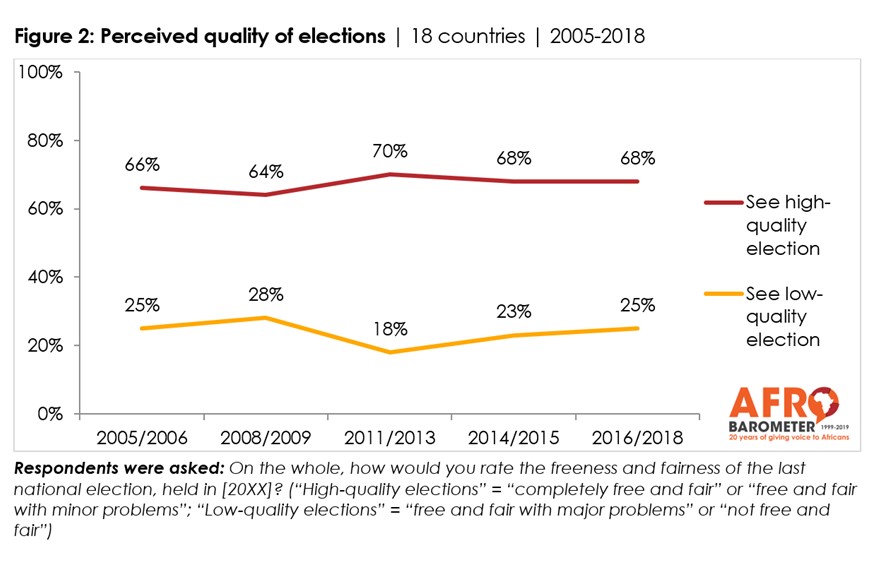Sudan’s protesters are risking their lives for fair elections — not the “snap election” that military rulers have tried to force on them as a way to perpetuate the entrenched political regime.
Their dramatic insistence on time to create the necessary conditions for free and fair elections embodies the desires of their fellow Africans, who want high-quality elections — and nothing less.
Across Africa’s 54 countries, almost two dozen will choose presidents and legislators in national elections in 2019. Judging by election quantity, multiparty competition appears firmly established in African politics.
Yet all too often, headlines point to leaders who manipulate electoral rules or outcomes to maintain power. Recent examples: Togo’s passage of term limits that could extend President Faure Gnassingbé’s rule until 2030, and Congo’s widely disputed election victory by ex-President Joseph Kabila’s handpicked successor.
How good are Africa’s elections? Do citizens care?
They do care, according to recent Afrobarometer public-opinion survey findings from 34 African countries. In fact, to a significant extent, the quality of their elections determines whether they even want elections.
Even more intriguing: Who wins their elections — the incumbent or the challenger — is a major factor in whether they think their elections are free and fair — and thus whether they support having elections in the first place.
Are elections the best way to choose leaders?
On average, three-fourths (75 percent) of the Africans interviewed in 2016-2018 say they want to choose their leaders through “regular, open and honest elections.” More than half (54 percent) feel “very strongly” that elections are better than “some other method.” Popular support for elections was a bit higher in the recent past (83 percent in 2011-2013) and is weaker in some Southern African countries, such as Mozambique (61 percent), South Africa (61 percent), Malawi (57 percent), eSwatini (54 percent) and Lesotho (48 percent). In some West African countries, on the other hand, it approaches nine out of 10 citizens (such as 88 percent in the Gambia and 87 percent in Sierra Leone).

Are elections free and fair?
Almost two-thirds (63 percent) of all Africans say their country’s most recent national election was generally free and fair (either “completely” or “with minor problems”). Only 15 percent say it was “not free and fair.” Popular perceptions of a high-quality election vary widely by country, from 87 percent in Ghana to 17 percent in Gabon, but on average these assessments have remained almost unchanged since 2005.
One surprise is that supporters of the opposition party are just about as likely as ruling-party supporters to see their last election as free and fair — an encouraging finding for those working to consolidate democracy on the continent.

Why quality matters
It seems obvious that “free and fair” elections are better than “unfree and unfair” elections. But one specific reason they’re better is that citizens use assessments of election quality as a benchmark for deciding whether they even want elections. In other words, they support elections if they are cleanly run; they do not support elections if they think electoral procedures are manipulated.
According to the latest Afrobarometer data, this is especially true in countries that have undergone recent transitions from autocratic to democratic rule — such as the Gambia, Sierra Leone and Liberia — as well as countries whose democracies have developed deeper roots — such as Ghana, Botswana and Namibia.
Four in ten Africans are deeply committed to democracy. That’s the good news.
Why leadership change matters
Many factors can affect how free and fair an election is, such as whether the opposition was given an equal chance to participate, whether media coverage was fair, whether votes were counted accurately, and so on.
One important discovery is that a victory by the opposition party makes people more likely to see the election as free and fair. After an election that produced a change in ruling party, 71 percent of Africans say the election was free and fair; just 56 percent say the same for elections that confirmed the incumbent party in power. In other words, leadership alternation is seen as the strongest possible evidence for what constitutes a high-quality election.
Clearly, Africans do care about elections. They want them — if the elections are well conducted. They judge that these contests have been well conducted if the election leads to a change of top political leadership. Simply stated, Africans support elections to the extent that they bring about desired political change.
Read more:
African countries have started to push back against Chinese development aid. Here’s why.
In Africa, presidential term limits are working.
Are protests in Africa politically or economically motivated? This new book has answers.
Don’t miss anything! Sign up to get TMC’s smart analysis in your inbox, three days a week.
Michael Bratton is a senior adviser to Afrobarometer.
Sadhiska Bhoojedhur is a research analyst at StraConsult Ltd, the Afrobarometer national partner in Mauritius.



